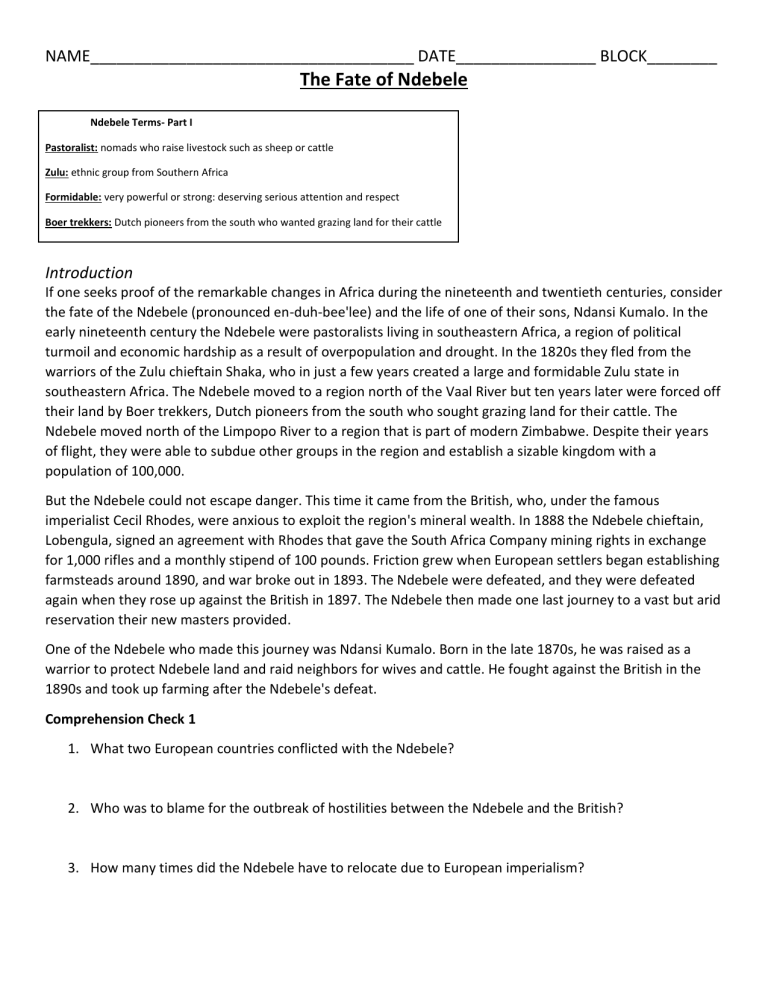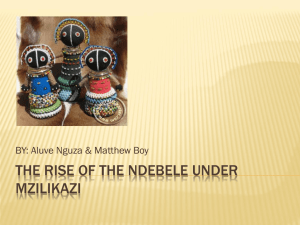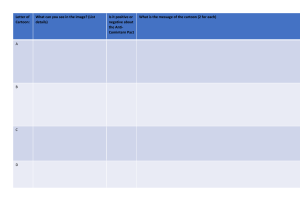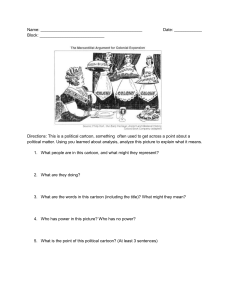
NAME_____________________________________ DATE________________ BLOCK________ The Fate of Ndebele Ndebele Terms- Part I Pastoralist: nomads who raise livestock such as sheep or cattle Zulu: ethnic group from Southern Africa Formidable: very powerful or strong: deserving serious attention and respect Boer trekkers: Dutch pioneers from the south who wanted grazing land for their cattle Introduction If one seeks proof of the remarkable changes in Africa during the nineteenth and twentieth centuries, consider the fate of the Ndebele (pronounced en-duh-bee'lee) and the life of one of their sons, Ndansi Kumalo. In the early nineteenth century the Ndebele were pastoralists living in southeastern Africa, a region of political turmoil and economic hardship as a result of overpopulation and drought. In the 1820s they fled from the warriors of the Zulu chieftain Shaka, who in just a few years created a large and formidable Zulu state in southeastern Africa. The Ndebele moved to a region north of the Vaal River but ten years later were forced off their land by Boer trekkers, Dutch pioneers from the south who sought grazing land for their cattle. The Ndebele moved north of the Limpopo River to a region that is part of modern Zimbabwe. Despite their years of flight, they were able to subdue other groups in the region and establish a sizable kingdom with a population of 100,000. But the Ndebele could not escape danger. This time it came from the British, who, under the famous imperialist Cecil Rhodes, were anxious to exploit the region's mineral wealth. In 1888 the Ndebele chieftain, Lobengula, signed an agreement with Rhodes that gave the South Africa Company mining rights in exchange for 1,000 rifles and a monthly stipend of 100 pounds. Friction grew when European settlers began establishing farmsteads around 1890, and war broke out in 1893. The Ndebele were defeated, and they were defeated again when they rose up against the British in 1897. The Ndebele then made one last journey to a vast but arid reservation their new masters provided. One of the Ndebele who made this journey was Ndansi Kumalo. Born in the late 1870s, he was raised as a warrior to protect Ndebele land and raid neighbors for wives and cattle. He fought against the British in the 1890s and took up farming after the Ndebele's defeat. Comprehension Check 1 1. What two European countries conflicted with the Ndebele? 2. Who was to blame for the outbreak of hostilities between the Ndebele and the British? 3. How many times did the Ndebele have to relocate due to European imperialism? Ndebele Terms- Part II Mashona: pastoralists subject to the Ndebele Places in Zimbabwe: Bulawayo Shangani Matappos Kraal: the stockade where the king lived Abominable: very unpleasant; disagreeable Flogged: to beat with a whip or stick especially as punishment Ndansi Kumalo, HIS STORY We were terribly upset and very angry at the coming of the white men, for Lobengula was under their protection and it was quite unjustified that white men should come with force into our country. Lobengula had no war in his heart: he had always protected the white men and been good to them. The white people had entered Bulawayo; the King's kraal had been burnt down and the King had fled. Of the cattle very few were recovered; most fell into the hands of the white people. Only a very small portion were found and brought to Shangani where the King was, and we went there to give him any assistance we could. Three of our leaders mounted their horses and followed up the King and he wanted to know where his cattle were; they said they had fallen into the hands of the whites, only a few were left. He said, "Go back and bring them along." But they did not go back again; the white forces had occupied Bulawayo and they went into the Matoppos. Then the white people came to where we were living and sent word round that all chiefs and warriors should go into Bulawayo and discuss peace, for the King had gone and they wanted to make peace. The white people said, "Now that your King has deserted you, we occupy your country. Do you submit to us?" What could we do? "If you are sincere, come back and bring in all your arms, guns, and spears." We did so.... So we surrendered to the white people and were told to go back to our homes and live our usual lives and attend to our crops. But the white men sent native police who did abominable things; they were cruel and assaulted a lot of our people and helped themselves to our cattle and goats. These policemen were not our own people; anybody was made a policeman. We were treated like slaves. They came and were overbearing and we were ordered to carry their clothes and bundles. They interfered with our wives and our daughters and molested them. In fact, the treatment we received was intolerable. We thought it best to fight and die rather than bear it. How the rebellion started I do not know; there was no organization, it was like a fire that suddenly flames up. We had been flogged by native police and then they rubbed salt water in the wounds. There was much bitterness because so many of our cattle were branded and taken away from us; we had no property, nothing we could call our own. We said, "It is no good living under such conditions; death would be better -let us fight." Our King gone, we had submitted to the white people and they ill-treated us until we became desperate and cried to make an end of it all. We knew that we had very little chance because their weapons were so much superior to ours. But we meant to fight to the last, feeling that even if we could not beat them we might at least kill a few of them and so have some sort of revenge. Comprehension Check 2 1. How did conditions following the war lead to the 1897 rebellion? Ndebele Terms- Part III Maxims: machine gun Rinderpest: an acute infectious disease of cattle s.= shilling, one-twentieth of a pound Ndansi Kumalo, HIS STORY (continued) I fought in the rebellion. We used to look out for valleys where the white men were likely to approach. We took cover behind rocks and trees and tried to ambush them. We were forced by the nature of our weapons not to expose ourselves. I had a gun, a breech-loader. They -the white men -fought us with big guns and Maxims and rifles. I remember a fight in the Matoppos when we charged the white men. There were some hundreds of us; the white men also were as many. We charged them at close quarters: we thought we had a good chance to kill them but the Maxims were too much for us. We drove them off at the first charge, but they returned and formed up again. We made a second charge, but they were too strong for us. I cannot say how many white people were killed, but we think it was quite a lot. Many of our people were killed in this fight: I saw four of my cousins shot. One was shot in the jaw and the whole of his face was blown away -like this -and he died. One was hit between the eyes; another here, in the shoulder; another had part of his ear shot off. We made many charges but each time we were beaten off, until at last the white men packed up and retreated. But for the Maxims, it would have been different.... So peace was made. Many of our people had been killed, and now we began to die of starvation; and then came the rinderpest and the cattle that were still left to us perished. We could not help thinking that all these dreadful things were' brought by the white people. We struggled, and the Government helped us with grain; and by degrees we managed to get crops and pulled through. Our cattle were practically wiped out, but a few were left and from them we slowly bred up our herds again. We were offered work in the mines and farms to earn money and so were able to buy back some cattle. At first we received a good price for our cattle and sheep and goats. Then the tax came. It was 10s. a year. Soon the Government said, "That is too little, you must contribute more; you must pay £1." We did so. Then those who took more than one wife were taxed; 10s. for each additional wife. The tax is heavy, but that is not all. We are also taxed for our dogs; 5s. for a dog. Then we were told we were living on private land; the owners wanted rent in addition to the Government tax; some 10s. some £1, some £2 a year.... Comprehension Check 3 1. The condition of the Ndebele rapidly deteriorated after the suppression of the rebellion. Why? 2. Aside from raising revenue, what might the British have hoped to achieve by imposing, then raising, taxes on Ndebele? Ndebele Terms- Part IV Scanty: small or insufficient in quantity or amount. Prosperous: having financial success or good fortune Ndansi Kumalo, HIS STORY (continued) Would I like to have the old days back? Well, the white men have brought some good things. For a start, they brought us European plows; we can buy European clothes. The Government has arranged for education and through that, when our children grow up, they may rise in status. We want them to be educated and civilized and make better citizens. Even in our own time there were troubles, there was much fighting and many innocent people were killed. It is definitely better to have peace instead of war, and our treatment generally by the officials is better than it was at first. But, under the white people, we still have our troubles. Economic conditions are telling on us very severely. We are on land where the rainfall is scanty, and things will not grow well. In our own time we could pick our own country, but now all the best land has been taken by the white people. We get hardly any price for our cattle; we find it hard to meet our money obligations. If we have crops to spare we get very little for them; we find it difficult to make ends meet and wages are very low. When I view the position, I see that our rainfall has diminished, we have suffered drought and have poor crops and we do not see any hope of improvement, but all the same our taxes do not diminish. We see no prosperous days ahead of us. There is one thing we think an injustice. When we have plenty of grain the prices are very low, but the moment we are short of grain and we have to buy from Europeans the price is high. As it is, if we do raise anything, it is never our own: all, or most of it, goes back to taxation. We can never save any money. If we could, we could help ourselves: we could build ourselves better houses; we could buy modern means of traveling about, a cart, or donkey or mules. As to my own life, I have had twelve wives altogether, five died and seven are alive. I have twenty-six children alive, five had died. Of my sons five are married and are all at work farming; three young children go to school. I hope the younger children will all go to school. I think it is a good thing to go to school. There are five schools in our district. Quite a number of people are Christians, but I am too old to change my ways. In our religion we believe that when anybody died the spirit remains and we often make offerings to the spirits to keep them good tempered. By now the making of offerings is dying out rapidly, for every member of the family should be present, but the children are Christians and refuse to come, so the spirit worship is dying out. A good many of our children go to the mines in the Union, for wages are better there. Unfortunately a large number do not come back at all. And some send money to their people- others do not. Some men have even deserted their families, their wives, and children. If they cannot go by train they walk long distances. Comprehension Check 4 1. What economic changes did the Ndebele experience as a result of their subjection to the Europeans? 2. Do you agree with Ndansi Kumalo that the arrival of Europeans was a mixed blessing? Why? Activity Draw a political cartoon from the perspective of the Ndebele that accurately reflects their message in this situation. The title of the political cartoon should be “The Fate of the Ndebele”. a) Your political cartoon should have the title, symbols, pictures, words, and/or labels that have a MESSAGE representative of the reading b) Your political cartoon should be neat, colorful, and creative Activity Draw a political cartoon from the perspective of the Ndebele that accurately reflects their message in this situation. The title of the political cartoon should be “The Fate of the Ndebele”. a) Your political cartoon should have the title, symbols, pictures, words, and/or labels that have a MESSAGE representative of the reading b) Your political cartoon should be neat, colorful, and creative Activity Draw a political cartoon from the perspective of the Ndebele that accurately reflects their message in this situation. The title of the political cartoon should be “The Fate of the Ndebele”. a) Your political cartoon should have the title, symbols, pictures, words, and/or labels that have a MESSAGE representative of the reading b) Your political cartoon should be neat, colorful, and creative Activity Draw a political cartoon from the perspective of the Ndebele that accurately reflects their message in this situation. The title of the political cartoon should be “The Fate of the Ndebele”. a) Your political cartoon should have the title, symbols, pictures, words, and/or labels that have a MESSAGE representative of the reading b) Your political cartoon should be neat, colorful, and creative Activity Draw a political cartoon from the perspective of the Ndebele that accurately reflects their message in this situation. The title of the political cartoon should be “The Fate of the Ndebele”. a) Your political cartoon should have the title, symbols, pictures, words, and/or labels that have a MESSAGE representative of the reading b) Your political cartoon should be neat, colorful, and creative



